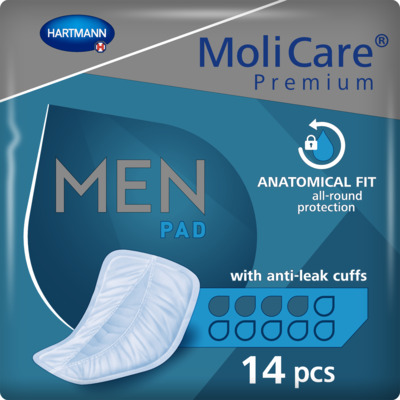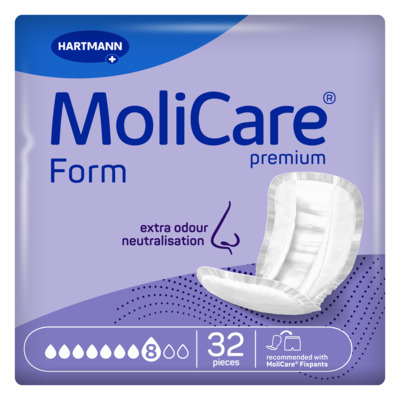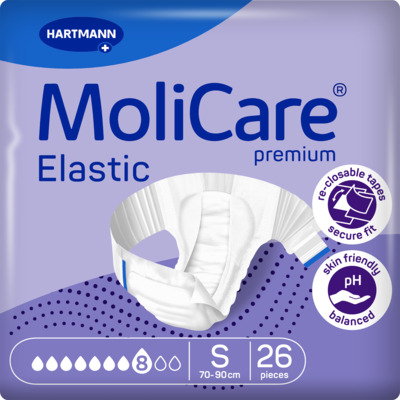Incontinence Advice
Health Tips For Men To Ensure You Feel Your Best
Men’s health tips: there are numerous examples online in regards to what you should and should not do to improve your health - but what are the right answers? Find out in this article now. Maintaining good health in men is essential to living a fulfilling life, but it can be challenging to know where to start. With so much information about what’s good or bad for our bodies, it’s easy to become overwhelmed. In this detailed article, you will find our recommendations for the best 12 health tips for men, from diet, to working out, lifestyle changes, visiting a healthcare professional, and more. Regardless of age, these health tips for men are suitable for all age groups in order to improve health and wellbeing.

The key components to achieving optimal health for men involve:
Maintaining balanced hormone levels.
Regular exercise.
Consuming a nutritious, balanced diet.
Prioritising mental and physical health.
Cutting out anything hazardous to health, including alcohol and smoking.
Checkups with a GP.
-
A healthy diet
When it comes to diet, there is no one-size-fits-all. All bodies are different. Even the NHS has put forth the eatwell guide for further details. In short, these are the main factors to consider in diet tips for men:
Fruits and vegetables: Consume at least five 80g servings of fruits and vegetables daily. Whether fresh, frozen, canned, or in juice form, they provide essential nutrients. More details can be found in our bladder cleansing foods guide.
Whole grains: Incorporate at least three servings of whole grains like oats, brown rice, and quinoa into your daily meals. These are foundational for a diet rich in fibre and nutrients.
Lean proteins: Minimise intake of saturated and trans fats found in processed and red meats, less than 70g, to reduce the risk of heart disease and certain cancers. Opt instead for lean proteins such as poultry, fish, and legumes, which offer necessary nutrients without the excess fat.
Hydration: Aim for a minimum of 1.5 litres of water daily to maintain hydration, aiding in detoxification and digestive health.
Fibre: Build your meals around fibre-rich foods, including whole-grain cereals, pasta, and legumes. These choices promote digestive health and satiety.
Fish: Incorporate at least two servings of fish per week, including one oily variety like salmon or mackerel, to benefit from heart-healthy omega-3 fatty acids.
Salt: Limit salt intake to under 6g daily. Opt for reduced-salt food products and avoid adding extra salt during cooking or at the table, to help prevent hypertension and heart disease.
Ensure to avoid these foods and drinks that irritate the bladder to improve the functioning of your organs.
2. Regular exercise Exercise is integral in men’s health, with benefits that extend to mental clarity, bone density, muscle strength, boosts in testosterone, and disease prevention. Men should aim for:
Daily activity: Engage in at least 30 minutes of moderate exercise daily to boost heart health and endurance.
Strength training: Incorporate strength-building workouts twice a week to improve muscle and bone strength. Never fear, as there are still ways to manage weightlifting and bladder leakages, too, for those concerned about sports and incontinence.
Flexibility and balance: Regular stretching and balance exercises improve mobility and reduce injury risk.
The induction of kegel exercises for men will assist in controlling your bladder too.

3. A balanced weight
Maintaining a healthy weight is pivotal in preventing numerous health conditions, including heart disease, diabetes, cancer, and mental health challenges. Conversely, being underweight poses risks such as osteoporosis, anaemia, and immune system deficiencies. Here are some health tips for men to sustain a healthy weight:
Balanced eating: Emphasise a diet rich in nutrients, with an appropriate mix of fruits, vegetables, whole grains, and lean proteins (see above for further details).
Caloric awareness: Opt for foods that are nutrient-dense rather than calorie-dense, avoiding excess sugar and saturated fats.
Portion control: Be mindful of meal sizes to prevent overeating.
Hydration: Drink ample water and low-calorie beverages to support metabolic functions and satiety.
Physical activity: Regular exercise helps burn calories and maintain muscle mass, contributing to a healthy weight.
4. Limit alcohol consumption
The impact of alcohol on health is profound and multifaceted. For men, regulating alcohol intake is crucial to mitigate risks like accidental injuries, hypertension, liver ailments, cardiovascular issues, and certain cancers. Beyond physical health, alcohol can adversely affect mental well-being, leading to poor judgement, risky behaviours, and psychological distress.
Men are advised to limit alcohol consumption to 14 units per week, distributed over at least three days. This has been advised by Drinkaware. This equates to about six glasses of wine or six pints of beer. While no alcohol consumption level is entirely risk-free, adhering to these guidelines can significantly decrease the likelihood of alcohol-related health issues.
You can learn more with our guide on alcohol and the impact on the bladder and bowels. Instead, try to integrate these bladder friendly drinks into your diet with greater health benefits.
5. Quit Smoking
Quitting smoking is an essential health tip for men, with immediate and long-lasting benefits. Whilst it may not be easy to do, quitting will inevitably improve your physical condition, lung function and energy levels, but also significantly reduce the risk of chronic diseases like heart conditions and high blood pressure.
Some may opt for vaping and other less harmful smoking methods, but to get the full effect, removing any form of smoking from your lifestyle completely will increase sensory skills and a healthier future.
Benefits of quitting smoking would include a better sense of taste and smell, losing the ‘smoker’s cough,’ more spikes in energy levels, and finding it easier to breathe.

6. Have A Skin Care Routine
Healthy skin is a testament to overall well-being. Establishing a skincare routine that aligns with your skin type is essential. Daily cleansing, shaving, and regular moisturising will maintain skin integrity and appearance. Sun protection and regular dermatological check-ups are crucial, especially to monitor changes and prevent skin cancer.
Men over 50 are more likely to develop skin cancer as well, so looking after your skin and moisturising, as well as using appropriate sun protection, will reduce the risk too.
For those managing incontinence, specialised skincare prevents irritation and ensures comfort, underscoring the importance of using products designed for sensitive areas.
Quality sleep is pivotal towards improving overall health in both men and women, repairing the body and fostering mental clarity in the process. Establishing a consistent sleep routine, moderating stimulants, and creating a restful environment are key to achieving a better night’s sleep. This practice not only wards off chronic health issues but also strengthens cognitive and emotional resilience, essential for a balanced and healthy life.
8. Mental Health
Regarding the concept of mental health, there has been a gradual increase in regards to the importance of it as much as physical health. Identifying stressors, developing coping strategies, and seeking support when needed will aid in mental health improvement.
Engaging in physical activities, pursuing favourable hobbies, and prioritising sleep are proactive steps towards bettering mental wellness. Acknowledging and addressing mental health needs is a strength, leading to a more fulfilling and balanced life.

9. Health Screenings and PSA Testing
Regular health screenings are indispensable for early detection and management of potential health concerns. Discussions about prostate health and PSA testing with healthcare providers are vital, particularly for those at higher risk due to genetic or lifestyle factors.
Men's health screenings are essential and typically cover the following:
Physical examination: A thorough check-up that includes an assessment of the testicles and prostate.
BMI and body fat measurement: Evaluates body mass index and body fat percentage to assess overall health.
Blood pressure monitoring: Regular checks to ensure blood pressure is within a healthy range.
Cholesterol level testing: Determines cholesterol levels to assess cardiovascular health risks.
Thyroid function test: Analyses thyroid health to detect any hormonal imbalances.
Blood and urine analysis: Urine tests can aid in scanning for various health conditions, such as whether there is blood in urine.
Nutritional and lifestyle evaluation: Assesses diet, physical activity, and lifestyle choices for overall health.
Vision screening: Examines eye health and vision accuracy.
Cardiac assessment: Includes a resting electrocardiogram (ECG) to evaluate heart health.
Lung health check: A chest X-ray to examine lung and chest health.
Having health screenings with aid in the early recognition of prostate problems that could potentially lead to prostate cancer if left untreated.
10. Maintaining Testosterone Levels
Understanding the significance of testosterone is crucial for men's well-being. This hormone influences various physical traits and functions, from muscle strength to mood regulation. Natural declines in testosterone levels start around age 30 to 40, yet certain lifestyles can exacerbate this decrease.
Factors such as obesity, sedentary habits, poor diet, excessive alcohol, and specific medical conditions like sleep apnea and diabetes can further reduce testosterone levels.
11. Understand Different Body Types
Men's bodies vary significantly, often fitting into one of three categories:
- Ectomorphs (slim and lean)
- Mesomorphs (muscular and well-built)
- Endomorphs (broader and more prone to weight gain).
Understanding your body type can guide appropriate fitness and nutritional choices, helping to set realistic health goals.
12. Healthy Fats and Minerals
Incorporating healthy fats into your diet is vital for testosterone production too. Options like avocados, olive oil, and fatty fish are excellent choices.
For those with incontinence problems, use our male incontinence products to aid in a better lifestyle.
Men's Health Tips To Make You Feel Your Best
In conclusion, there are multiple layers towards the right health tips for men, especially with numerous body types and lifestyles to consider. Of course, a balanced diet, regular exercise, mental wellness, and medical screenings are just fundamental stepping stones to regulate along the way. Furthermore, not all of these tips should be implemented at once. But by consulting your healthcare professional beforehand, can immediately set you up for a better life.FAQs
What should men do to be healthy?
Men should maintain a balanced diet, engage in regular physical activity, get adequate sleep, manage stress, and avoid harmful habits like smoking and excessive drinking.
What are the nutritional tips for men?
Men should focus on consuming lean proteins, fruits, vegetables, whole grains, and healthy fats. It's important to limit processed foods, saturated fats, and high-sugar items. Staying hydrated and monitoring portion sizes are also crucial for good nutrition.
How should a man take care of his body?
A man should take care of his body by adopting a healthy lifestyle that includes regular exercise, a balanced diet, sufficient sleep, and stress management. Regular health screenings and personal hygiene practices are also vital components of body care.
Sources
NHS. (n.d.) The Eatwell Guide. [online] Available at: https://www.nhs.uk/live-well/eat-well/food-guidelines-and-food-labels/the-eatwell-guide/ [accessed 15/03/24]
Drinkaware. (n.d.) UK low risk drinking guidelines. [online] Available at: https://www.drinkaware.co.uk/facts/information-about-alcohol/alcohol-and-the-facts/low-risk-drinking-guidelines [accessed 15/03/24]
HCA Healthcare UK. (n.d.). Men's Health Screening. [online] Available at: https://www.hcahealthcare.co.uk/our-services/tests/mens-health-screening [accessed 15/03/24]

MoliCare® Premium Men Pad 4 Drops
<h2>Comfortable and absorbent</h2> <p>Why MoliCare for men? Hers are some of the key features of the MoliCare® Premium Men Pads from Hartmann:</p> <ul> <li>Discreet and comfortable</li> <li>Fits the male physique</li> <li>3-layer absorbent core</li> <li>Fast-absorbing system</li> <li>Anti-leakage cuffs</li> <li>Odour neutralisers</li> <li>Wide adhesive strip</li> <li>Skin-friendly</li> </ul> <p>With an affordable price and great quality guarantee, you cannot regret choosing MoliCare® Premium Men Pad 4 drops, equipped with anti-leak cuffs, and 14 pieces per bag.</p> <h2>Slim and discreet under clothing</h2> <p>MoliCare® Premium MEN Pads offer reliable support for men dealing with bladder weakness. Whether it's stress incontinence or urge incontinence, these pads for men are designed to provide a discreet and quick solution on the go. Simply place the pad before applying your underwear and secure it with the adhesive strip for worry-free protection. MoliCare® Premium MEN Pads offer full coverage for men facing very light to moderate bladder weakness.</p> <h2>Leakage protection for men</h2> <p>MoliCare® understands that each individual's incontinence needs are unique. That's why our incontinence products, including MoliCare® Premium MEN Pads, are available in different absorbency levels. You can find the perfect fit and protection for your specific requirements.</p> <h2>Reliable and soft on the skin</h2> <p>Our body-shaped absorbent pads are designed to deliver dependable and skin-friendly incontinence protection every day. Experience discreet comfort with the soft, cotton-like materials and the added benefit of an odour neutraliser, ensuring you feel fresh and confident throughout the day.</p> <h2>Fast delivery to your home</h2> <p>At HARTMANN Direct, we ensure a fast delivery service for all our products. Enjoy free delivery on orders over £50, making it convenient and hassle-free to receive the incontinence products you need. Our dedicated customer care team is here to discuss your incontinence product needs and answer any questions you may have. Call us today on 0800 028 9470 to experience the comfort and confidence that MoliCare® Premium MEN Pads can provide.</p>
MoliCare® Premium Form 8 Drops
<h2>Dermatologically tested incontinence pads</h2> <p>Experience comfort and protection against bladder weakness with MoliCare® Premium Form 8 Drops Pads. These pads are designed to provide you with exceptional comfort, tailored to your body's shape. Offering a range of absorbencies, they ensure the right level of protection for moderate to very severe incontinence. With elasticated seams to prevent urine from escaping from the side of the pad, these pads provide added security against leakages.</p> <h2>Absorbent Core Technology</h2> <p>At the core of these soft and breathable pads lies MoliCare®'s unique absorbent core technology, which effectively draws moisture away from your body, leaving your skin feeling dry. The soft textile-like backing sheet reduces rustling noise, while integrated odour neutralisers keep you feeling fresh and confident throughout the day. Dermatologically tested, we recommend pairing the MoliCare® Premium Form 8 Drops with our <a href="https://www.hartmanndirect.co.uk/incontinence-products/large-pads-and-fixation-pants" style="color:#0563c1; text-decoration:underline">fixation pants</a> for all-day comfort and security.</p> <h2>Convenient incontinence products</h2> <p>No matter the level of incontinence you experience, MoliCare® Premium Form 8 Drop Pads offer a convenient solution to confidently manage your needs. You can easily order our products online with the assurance of our price match promise and delivery straight to your doorstep. Enjoy free delivery on all orders over £50.</p> <p>If you require further assistance, our knowledgeable customer care team is available to answer any questions you may have. Contact us today at 0800 028 9470 and regain control of your life with MoliCare® Premium Form 8 Drops Pads.</p> <p>*Based on a study conducted among German nursing homes in 2021.</p>
MoliCare® Premium Mobile 5 Drops
<h2>MoliCare Premium Mobile 5 Drops: The Solution for Incontinence</h2> <p>Experience the ultimate solution for managing moderate to very severe incontinence with MoliCare® Premium Mobile 5 Drop incontinence pants. These innovative pull-on pants provide the look and feel of ordinary underwear, ensuring discreetness and exceptional protection.</p> <p>With your comfort and security in mind, the discreet and adaptable design of MoliCare® Premium Mobile pants conforms to the shape of your body.</p> <p>The pH-balanced formulation ensures effective skin protection, preserving the natural balance and health of your skin. Featuring a three-layer absorbent core, these pants lock away urine, providing dryness and ensuring you stay comfortable and confident. The anti-leakage system offers extra security and protection, preventing any leaks or accidents. Odour neutralisers are added to provide long-lasting freshness and confidence, eliminating unwanted odours.</p> <h2>High Absorption Capabilities</h2> <p>MoliCare® Premium Mobile 5 Drop pants provide superior absorption capabilities, making them the perfect choice for managing moderate incontinence. With varying levels of absorbencies available, you can choose the one that suits your specific needs. The breathable fabric, anatomical shape, and absorbent core keep moisture away from your body, keeping your skin dry. Enjoy the convenience of easy removal with the quick tear-open sides of MoliCare® Premium Mobile pants, which is even suitable for those with severe bladder weakness!</p> <h2>Choosing your Size</h2> <p>Measure waist at the largest width between the waist and hips. Select the product size based on the below sizing.</p> <p>Small: 24-35 inches (60-90cm)</p> <p>Medium: 31-47 inches (80-120cm)</p> <p>Large: 39-59 inches (100-150cm)</p> <p>Extra Large: 51-67 inches (130-170cm)</p> <p>Fast, reliable delivery service for all your essential <a href="https://www.hartmanndirect.co.uk/" style="color:#0563c1; text-decoration:underline">HARTMANN Direct</a> incontinence products straight to your door. Take advantage of our convenient online ordering system and benefit from our price match promise, along with free delivery on orders over £50. Our friendly customer service team is here to assist you in selecting the right product for your needs.</p> <p> </p>
